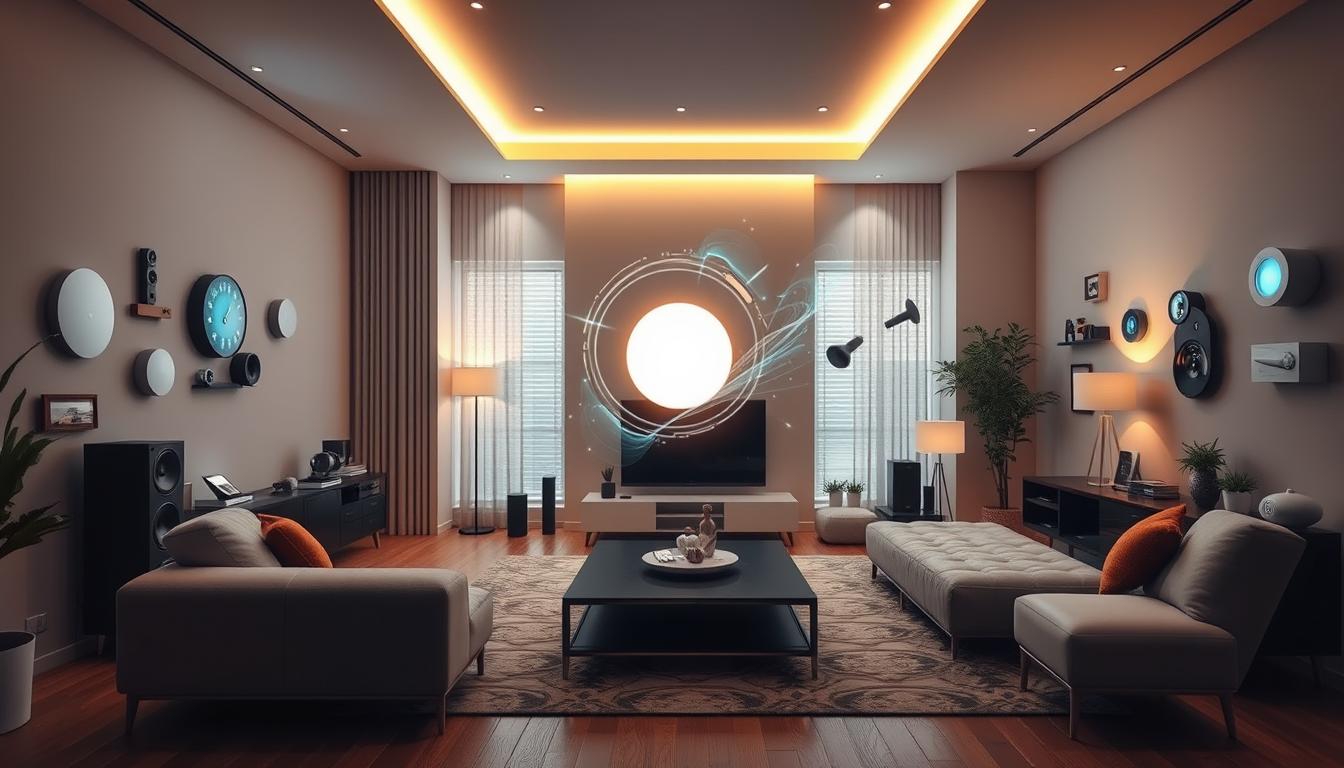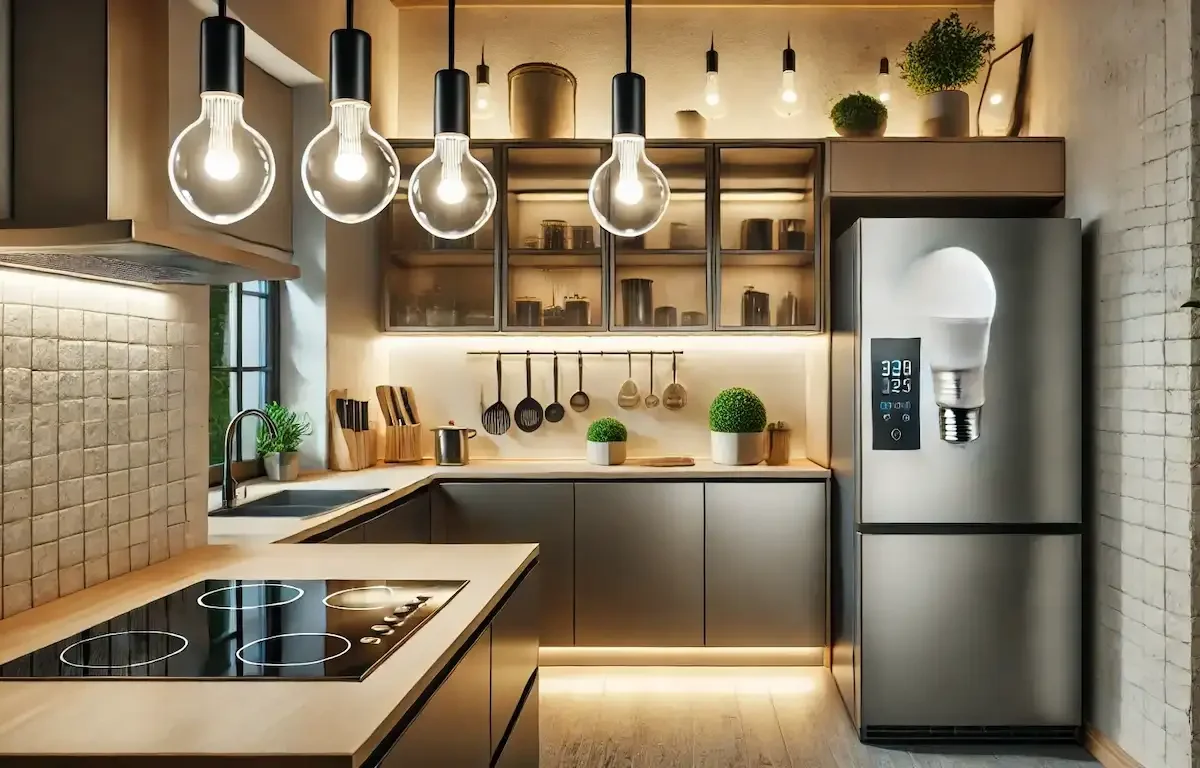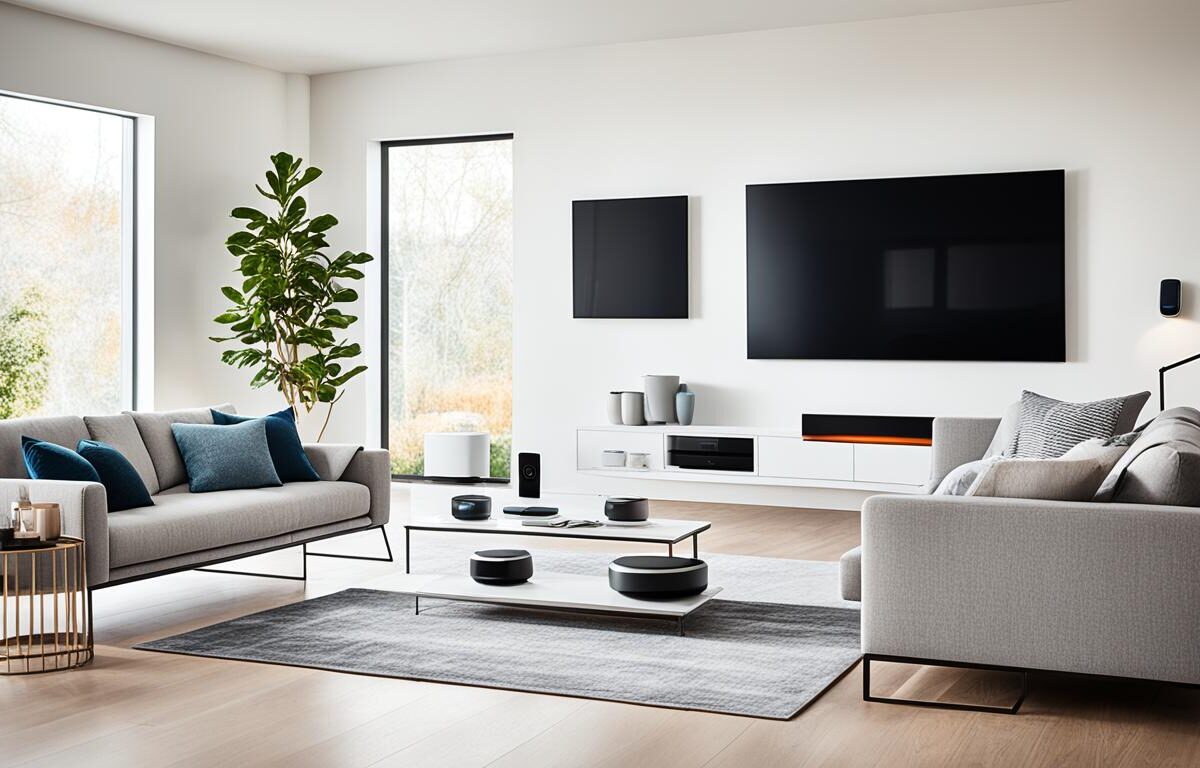Voice assistants like Amazon’s Alexa, Google Assistant, and Apple’s Siri have changed smart homes forever. These devices let us control our homes with just our voices. They make our lives easier and more convenient.
With voice assistants, we can manage our smart devices easily. We can set up routines and automations that fit our lives. This makes our homes more comfortable and efficient.
These technologies let us control devices without using our hands. They also let us customize our smart homes to our liking. This makes our smart home experiences unique and personal.
Introduction to Voice Assistants in Smart Homes
Voice assistants have made smart homes a reality. They change how we talk to our homes, bringing us more convenience and personalization. Voice assistants can manage many smart devices, like setting the thermostat, turning off lights, locking doors, and playing music, all with just your voice.
This easy integration has led to more voice-controlled smart homes. Homeowners can set up routines and automate many tasks at once. With voice assistants, managing your home becomes easy and hands-free, making life more efficient.
Convenience and Personalization with Voice Commands
Voice assistant integration in smart homes brings personalized info. They give users weather updates, recipe ideas, and tailored preferences, making daily tasks easier.
“The integration of voice assistants has resulted in increased demand for smart home devices, making it easier for users to manage different aspects of their homes efficiently.”
Using voice commands to control smart devices means no more juggling remotes or apps. This makes using smart home technology better overall.

Voice Assistants and Smart Home Integration
The smart home revolution is growing fast, and voice assistants are at the heart of it. They let users control many devices with just their voice. Now, you can easily manage things like lights, security, and entertainment with voice commands.
This integration makes daily tasks easier and lets you customize your home with just a few words. It’s a big change that makes life more efficient.
Seamless Control of Connected Devices
Voice assistants have changed how we use our smart devices at home. Voice assistant control means you can change lights, watch security cameras, and control entertainment without touching them. This smart home device integration brings a new level of ease and efficiency, making life more streamlined.
Creating Customized Routines and Automations
Voice assistants also let you set up customized routines and automations. You can tell your assistant to do things automatically, like turn off lights or lock doors when you leave. Or, it can adjust the thermostat when you get home. This smart home automation boosts convenience, saves energy, and helps the planet.
“Voice assistants have become an indispensable tool in the smart home, allowing users to seamlessly control their connected devices and create tailored routines that simplify their daily lives.”
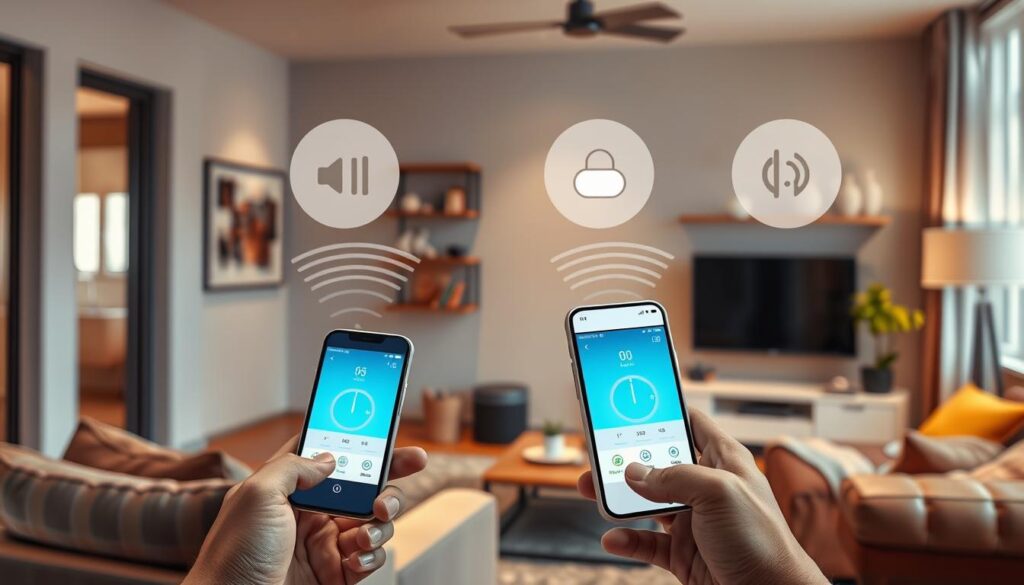
Benefits of Voice Assistants in Smart Homes
Voice assistants have changed how we use our homes. They let us control devices with just our voice. This makes things easier, faster, and more accessible. Now, with a simple voice command, we can manage lights, temperature, security, and entertainment easily.
Using voice assistants makes life better. It saves time by letting us give commands without using apps or physical controls. This is great for people who have trouble moving around, as it makes controlling the home easier and more accessible.
- Hands-Free Control: Users can easily manage their smart homes while doing other things, making life more efficient.
- Increased Energy Efficiency: Devices like thermostats can be set with voice commands, saving energy and cutting down on bills.
- Personalized Experience: Over time, voice assistants learn what we like, giving us a smarter home experience.
Voice assistants work well with smart devices, creating a smarter home system. They help devices work together smoothly. This makes our homes more convenient and efficient.
“Voice assistants are poised to unlock a universe of possibilities for smart home ecosystems, making our lives more comfortable, safer, and efficient in the process.”
As voice technology gets better, voice assistants will offer more benefits in smart homes. They will improve control, personalization, accessibility, and energy use. These smart helpers are changing how we live in our homes.
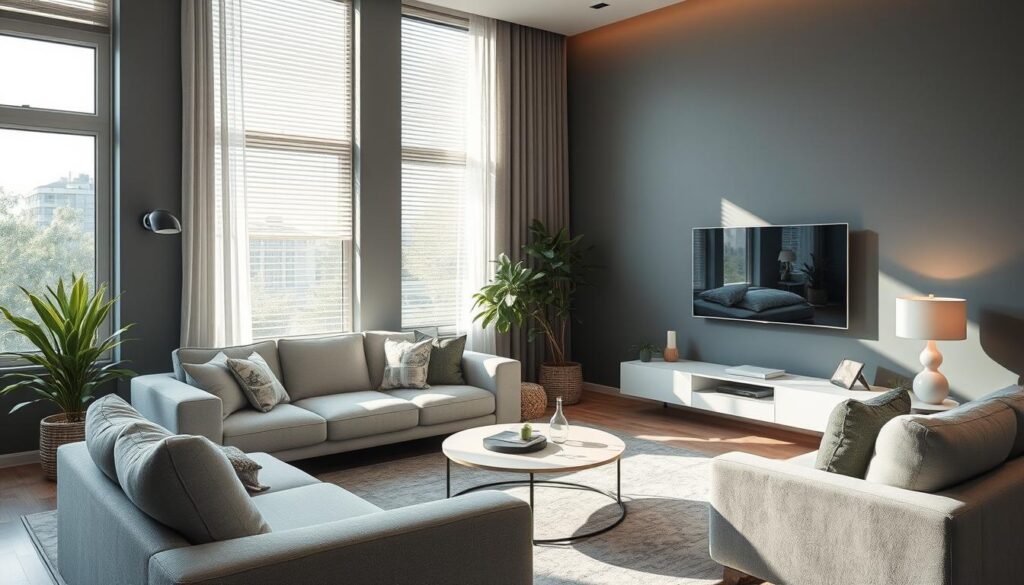
Voice Assistants
Voice assistants are getting better at understanding and responding to what we say. They can now handle complex speech patterns, making our interactions smoother. They can also keep track of our conversations to give better help. This makes them key in making smart homes more user-friendly.
Understanding Natural Language Processing
Natural language processing (NLP) is what lets voice assistants understand our speech. It helps them figure out what we mean by our words and phrases. Thanks to big improvements, these technologies now grasp the subtleties of language better, making our chats with them more natural.
Multi-Turn Dialogues and Contextual Awareness
Voice assistants are getting better at following along in conversations and remembering what we’ve talked about before. This means they can give us answers that are more relevant and personal. It makes talking to them feel more like chatting with a friend who gets what you’re saying.
These advances in understanding language and following conversations have made voice assistants a big hit in smart homes. As we look for easier and more personalized ways to interact, these technologies will keep evolving. They will play a big part in the future of voice-controlled smart homes.
| Voice Assistant | 2024 US Users (Millions) |
|---|---|
| Google Assistant | 88.9 |
| Apple Siri | 84.2 |
| Amazon Alexa | 75.7 |
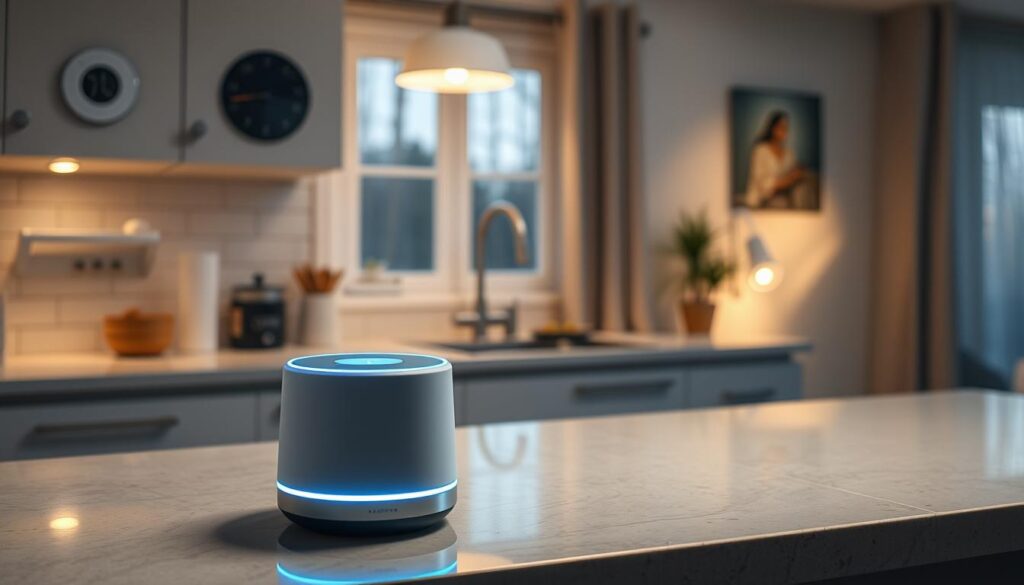
“Voice assistants are evolving to become more personalized and offer tailored and proactive assistance.”
The Power of AI Voices
AI-powered voices have changed how we talk to virtual assistants at home. These voice synthesis technologies make virtual assistants more personal. They can change the assistant’s voice to match what you like. This makes the assistant sound more like you, building trust and connection.
Now, AI voices sound more natural and real. They can copy your voice’s tone and feelings. This makes talking to smart home devices feel smoother and more natural.
The future of AI voices is exciting. Imagine your smart home assistant always greeting you in your own voice. This makes your daily life easier and builds a strong bond with your smart home.
“The integration of AI-powered voices has revolutionized the way we interact with virtual assistants in smart homes.”
As AI voices get better, so will our smart homes. They will become more convenient and connected. This will make our lives easier and more enjoyable.

Smart Home Ecosystem Integration
Voice assistants have changed how we use and control our smart homes. They let us control things with just our voice. This makes smart homes easier to use, especially for people who have trouble moving or seeing.
These smart systems work well with voice assistants. They let people with disabilities control things like lights and security systems easily. This means they can live more on their own.
Hands-Free Control and Accessibility
PwC says most people with voice assistants use them every day. This shows how useful and easy voice-controlled smart homes are. Juniper Research predicts that in the U.S., voice assistants will go from 25 million in 2018 to 275 million by 2023.
Enhancing Independence for Users with Disabilities
Voice assistants are a big help for people with disabilities. They make controlling smart devices easy without needing to use your hands. Amazon, Google, and Apple are always making their voice assistants better, offering more ways to live independently.
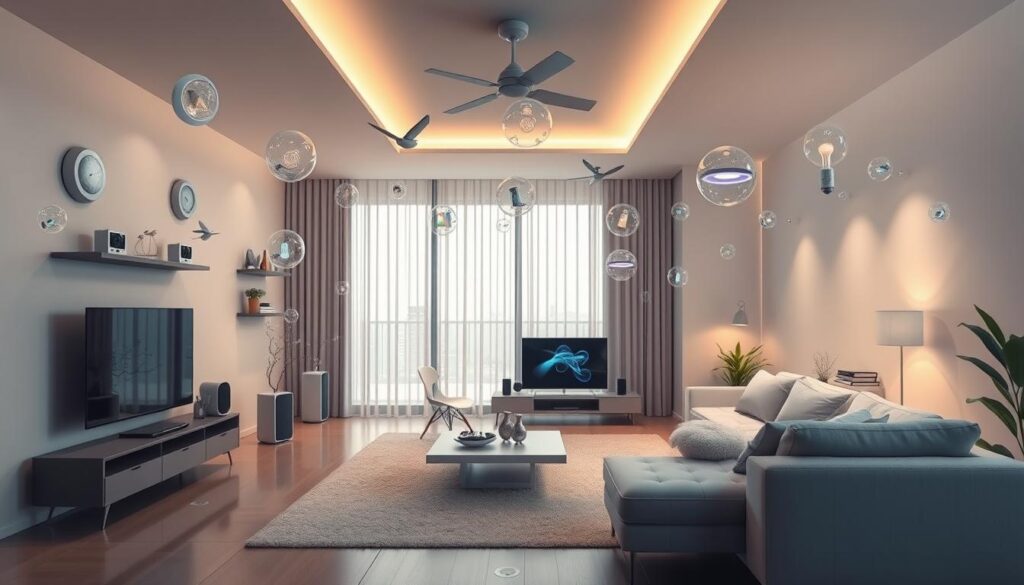
Challenges and Considerations
As more people use voice assistants in their homes, we face big challenges. One big worry is privacy. These devices listen all the time and could hear things we don’t want them to. They might even share our private info without our okay.
Also, how real these voices sound makes us wonder about authenticity and consent. We need to think hard to keep user trust.
It’s important to make voice assistants responsibly. We need to follow ethical principles to make sure they’re safe for smart homes. Developers should protect our data and be open about how they use it. This helps fix privacy concerns and keeps users trusting us.
Privacy and Data Protection Concerns
Voice assistants in smart homes make us worry about privacy and keeping our data safe. They listen all the time, so they hear everything from our daily chats to our private info. We need strong data protection and clear rules on what they can do with our info.
Building User Trust and Ethical Implications
Using voice assistant technology also brings up ethical questions. When these devices sound like real people, it can be hard to know if we’re really talking to a human. To keep user trust, we need to be honest about what these devices can do. This way, users can make smart choices.
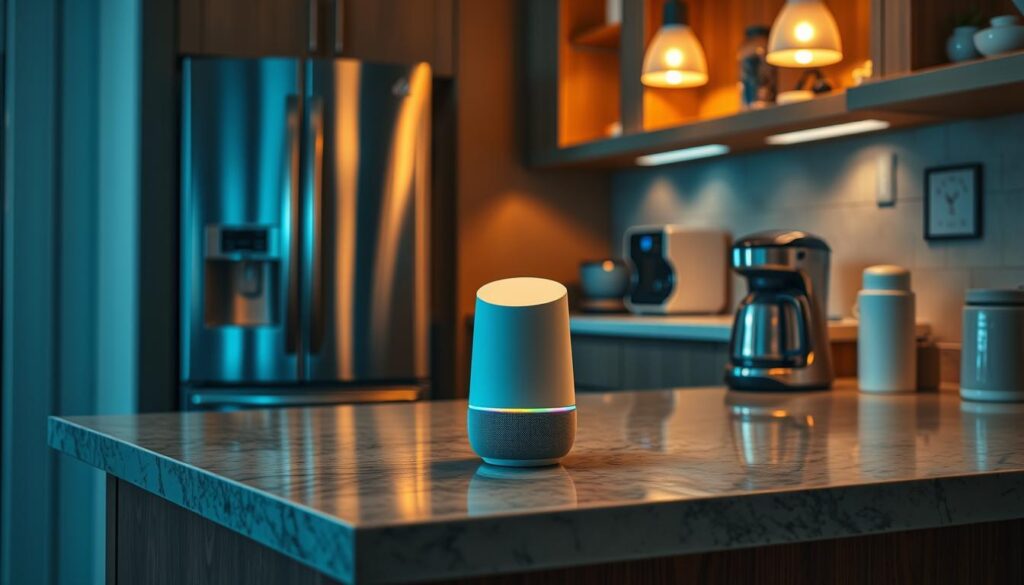
“As voice assistant technology gets better, we must focus on privacy protection, data security, and ethics. This ensures these powerful tools are used right in our smart homes.”
Future Trends in Voice Assistant Technology
The future of voice assistants in smart homes is exciting. Several key trends are emerging that will change how we use this technology. Homeowners can look forward to smarter, more versatile, and secure voice-controlled smart home experiences.
One big trend is better natural language processing (NLP). This means voice assistants will understand us better, making it easier to talk to them. Users will be able to have more natural conversations, making voice commands simpler and more accessible.
Another trend is the deeper connection between voice assistants and IoT devices. This will give homeowners full control over their smart home automation systems. Users will be able to manage everything from lights and temperature to security and appliances with just their voice.
Getting better at personalization is also important. Voice assistants will learn what each user likes and need. They will customize experiences, suggestions, and even their personalities to fit each homeowner’s life.
There will also be a big push for security and privacy in voice assistants. As we give these technologies more personal info, they’ll need to keep it safe. This means better security protocols and addressing ethical concerns about data privacy and trust.
The future of voice assistant technology in smart homes looks bright. We can expect more seamless, personalized, and secure ways to control our homes. As this tech gets better, it will change how we live and interact with our spaces.
| Trend | Impact |
|---|---|
| Enhanced Natural Language Processing | More intuitive and seamless voice interactions |
| Deeper IoT Integration | Comprehensive control over smart home devices |
| Personalization Advancements | Tailored experiences and virtual assistant personalities |
| Increased Focus on Security and Privacy | Robust security protocols and ethical data practices |
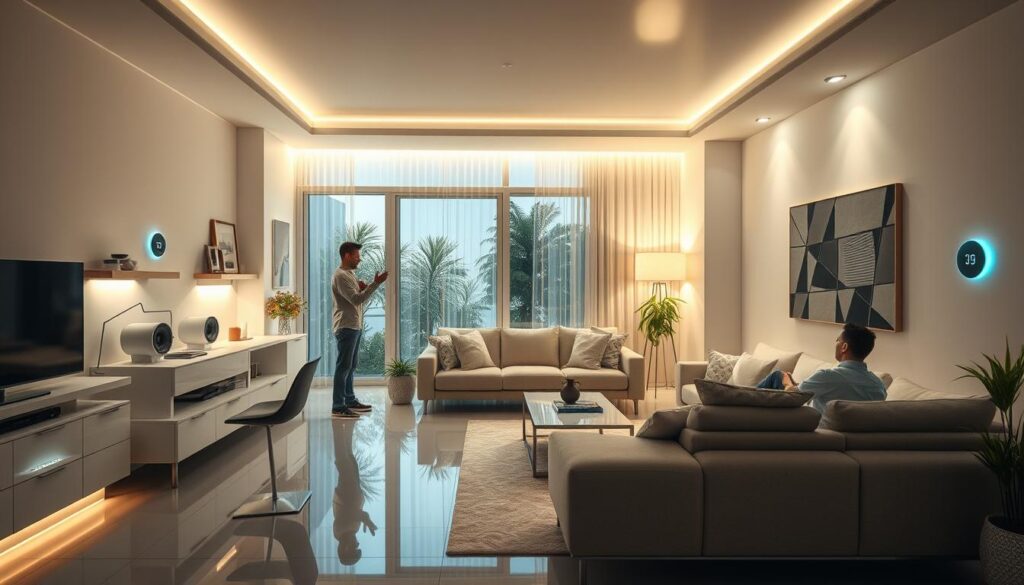
“The future of voice assistants in smart homes is poised for remarkable advancements, promising even more seamless, personalized, and secure experiences for homeowners.”
The Convenience of Voice Commands
In today’s smart homes, voice assistants change how we talk to our living spaces. They offer unmatched convenience with voice commands. With just a voice, users can easily manage many smart home devices, like lights, thermostats, security systems, and entertainment systems.
Voice assistants do more than just control devices. They help users schedule and coordinate activities at home. This includes setting reminders, changing routines, and handling daily tasks. This hands-free control makes our lives more efficient and comfy.
Compatibility with Smart Home Devices
Voice assistants are key for smart home integration. They let users control many connected devices with simple voice commands. Whether it’s changing the thermostat or turning on lights, these AI tools work well with a growing list of compatible smart home devices. This gives us a convenience we couldn’t imagine before.
Scheduling and Coordinating Activities
Voice assistants are also great for scheduling and coordinating activities at home. Users can set reminders, make personal routines, and manage tasks with just their voice. This voice-controlled automation makes managing the house easier, letting people focus on what’s important.
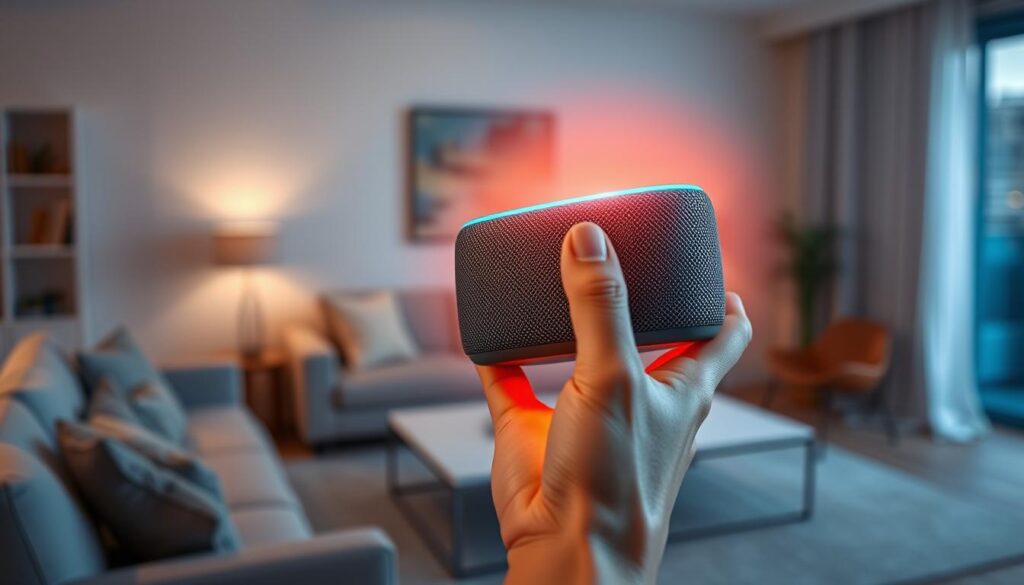
“The integration of voice assistants in hotel rooms started in the early 2010s, initially focusing on basic tasks like controlling lights and providing weather updates.”
Enhanced Security with Voice Assistants
Voice assistants are changing the game in smart homes and security. They use advanced voice recognition to offer secure entry and control. Now, homeowners can get into their homes and manage security with just their voice.
Voice Recognition Entry and Control
No more searching for keys or remembering codes. Voice assistants with top-notch voice recognition can be your home’s guardian. You can unlock doors, control security systems, and access certain areas just by speaking.
This makes getting into your home easy and keeps out unwanted visitors. It’s all about more convenience and less worry.
Real-Time Tracking and Alerts
Voice assistants do more than just control entry. They work with home sensors and security systems for real-time tracking and alerts. If something moves or a door opens without permission, you’ll know right away.
This means you can act fast if there’s a threat or emergency. It’s an added safety net for your family.
Voice assistants are changing how we see home security. They offer secure entry, real-time tracking, and alerts. These devices are pushing the limits of what smart home security can do.
User-Friendly Voice Control
Voice assistants have changed how we interact with our homes. They offer a simple way to control things without using our hands. This makes it easy for people of all ages and abilities to manage their homes on their own.
This shows how voice assistants make smart home tech available to more people. It’s not just for those who are tech-savvy anymore.
Voice interfaces are getting more popular because they’re easy to use. You can talk to your devices instead of typing. This makes interacting with them more natural.
Apps like Siri, Google Assistant, and Amazon Alexa can do many tasks. This shows how popular they are. Now, many apps let you use voice commands, making things easier for everyone.
Promoting Inclusivity and Accessibility
Apps with voice control are great for people with disabilities or who prefer not to use their hands. They help a wider range of people use technology. This makes life easier and more independent for many.
The future of voice in apps looks exciting. We’ll see more personalized and smart interactions. As voice tech gets better, we’ll have more ways to talk to our devices.
“Voice interfaces offer benefits such as accessibility for users with disabilities, increased efficiency, convenience in hands-free interactions, and natural interactions mimicking human conversation, highlighting their advantages in various use cases.”
Voice assistants have made smart homes more accessible and inclusive. They let people with physical challenges control their homes easily. User-friendly voice control is changing the game in smart home technology. It’s all about making things easier and more accessible for everyone.
Personalizing Your Smart Home with Voice Assistants
Voice assistants have changed how we interact with our homes. They offer convenience and security. They let homeowners make their smart homes truly their own.
With voice-activated devices, you can set up your home just how you like it. Adjust the lights and temperature with just your voice. You can also play your favorite music and set up schedules easily.
Voice assistants make your smart home experience unique. Homeowners can wake up to their favorite routines, set the mood with lighting and climate, and control security with just their voice. This makes living at home more convenient and comfortable.
| Product | Price | Features |
|---|---|---|
| Google Home Smart Speaker | $84.98 | Voice control, personalized playlists, smart home integration |
| Amazon Echo Pop | $39.99 | Compact design, voice commands, smart home control |
| Brilliant Smart Home Control Plug-In Panel | $399 | Touchscreen, voice control, customizable smart home automation |
Voice assistant technology is always getting better. It opens up endless possibilities for making your smart home unique. By adding these smart solutions, homeowners can create a space that fits their lifestyle perfectly.
“Voice control technology is transforming smart homes, allowing users to manage various functions with simple voice commands.”
– Taimur Ijlal, Smart Home Technology Expert
Conclusion
Voice assistants have changed how we interact with our homes. They make controlling our living spaces easy and convenient. With their help, we can manage devices without lifting a finger and enjoy better security and tailored experiences.
As technology gets better, the future of voice assistant-powered smart homes looks exciting. We can expect more intelligent and secure ways to live. By using voice assistants, homeowners can make their lives easier, more efficient, and more personal. This is changing the idea of home automation.
Now, more and more people in the U.S., about 142 million, use voice assistants. These tools are proving to be essential in our daily lives. They help improve customer service and encourage positive changes. This makes voice assistants key to the smart homes of tomorrow.

